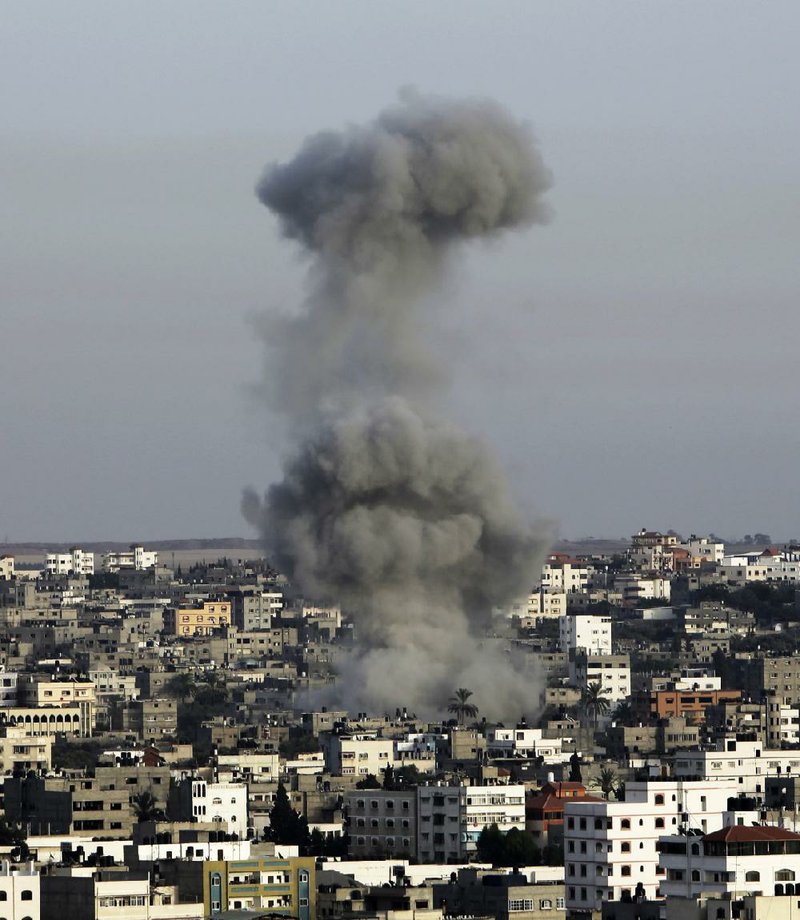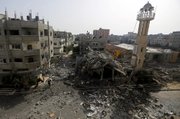GAZA CITY, Gaza Strip -- Israel on Saturday widened its range of Gaza bombing targets to civilian institutions with suspected Hamas ties and announced it would hit northern Gaza "with great force" to prevent rocket attacks on Israel.
RELATED ARTICLE
http://www.arkansas…">Gaza's Muslims spend Ramadan in fear of Israeli strikes
At least 156 Palestinians have been killed in five days of bombardment. One of the Israeli strikes Saturday hit a center for the disabled where Palestinians said two patients were killed and four people were seriously hurt. In a second attack, on Saturday evening, an Israeli warplane flattened the home of Gaza's police chief and damaged a nearby mosque as evening prayers ended, killing at least 18 people, officials said.
In New York, the U.N. Security Council called unanimously for a cease-fire, while Britain's foreign minister said he will discuss cease-fire efforts with his American, French and German counterparts today.
So far, neither Israel nor Gaza's Hamas rulers have signaled willingness to stop.
Finance Minister Yair Lapid said Israel would only be interested in a truce that is long term and would "dramatically weaken the capabilities of Hamas." Lapid said Israel would escalate its military operations and "raise the bar until Hamas understands it's not worth it for them."
Israel has carried out more than 1,200 airstrikes to try to diminish Hamas' ability to fire rockets at Israel, and the chief military spokesman, Brig. Gen. Motti Almoz, said Saturday that there would be more strikes, especially in northern Gaza near the Israeli border.
"We are going to attack there with great force in the next 24 hours due to a very large concentration of Hamas efforts in that area," he said. Late Saturday, the military said it was ordering Palestinians in northern Gaza to evacuate "for their own safety."
Gaza's Interior Ministry urged residents in the area to ignore Israel's warnings and to stay in their homes, saying the announcement was Israeli "psychological warfare" and an attempt to create confusion.
Shortly after the Israeli announcement, an Israeli warplane struck the home of the Gaza police chief, Taysir al-Batsh. The attack killed at least 18 people and wounded 50, Health Ministry official Ashraf al-Kidra said. He said worshippers were leaving the mosque after evening prayers at the time of the strike and that some people are believed to be trapped under the rubble.
Meanwhile, Hamas, the Islamic militant group that controls Gaza, fired nearly 700 rockets and mortars at Israel last week and said it wouldn't be the first to cease fire.
In a sign that the conflict might widen, Israel fired into Lebanon late Saturday in response to two rockets fired from there at northern Israel. There were no injuries or damage, but Israel fears militant groups in Lebanon may try to open a second front.
Israel has said it's acting in self-defense against rockets that have disrupted life across much of the country. It also accuses Hamas of using Gaza's civilians as human shields.
Critics said Israel's heavy bombardment of one of the most densely populated territories in the world is the main factor putting civilians at risk. Sarit Michaeli of the Israeli human-rights group B'Tselem said that while using human shields violates international humanitarian law, "this does not give Israel the excuse to violate international humanitarian law as well."
The Israeli military said it has targeted sites with links to Hamas, including command centers, and that it issues early warnings before attacking. But Michaeli said civilians have been killed when Israel bombed family homes of Hamas militants or when residents were unable to leave their homes quickly enough after the Israeli warnings.
In one attack Saturday, an Israeli missile hit the Palestine Charity, a center for the physically and mentally disabled in the northern Gaza town of Beit Lahiya.
The center is home to nine patients, including four who were spending the weekend with their families away from the center, said Jamila Alaiweh, the center's director. Of the remaining five, two were killed in the strike and three suffered serious burns and other injuries, the director said. A caregiver was also injured, she added.
The director said one of the women killed had cerebral palsy and the other had severe mental handicaps. Among the three wounded patients were a quadriplegic, one with cerebral palsy and one with mental disabilities, she said.
The missile destroyed the bottom floor of the two-story building. Rescuers sifted the pile of rubble, pulling out a folded-up wheelchair and a children's workbook.
Alaiweh said the facility was well-known in the neighborhood and that it had been in the same building for almost a decade. She said she had no idea why it would be bombed. "No one lived there except us," she said. "There was no one else in the building."
An Israeli military spokesman, Lt. Col. Peter Lerner, said he was looking into the attack.
An army statement said that from Friday morning to Saturday morning, Israel targeted 158 sites "affiliated with Hamas terrorism" in Gaza, including dozens of rocket launchers and a mosque where Hamas stored rockets and weapons.
Israel also targeted several civilian institutions with presumed ties to Hamas, widening its range of targets. Palestinian officials said this included a technical college, a media office, a small Kuwait-funded charity and a branch of an Islamic bank.
The Israeli military did not mention those institutions in its statement Saturday, saying only that in addition to the military targets, it struck "further sites."
Al-Kidra said that on top of the 156 dead, more than 1,060 people have been wounded.
Although the exact breakdown of casualties remains unclear, dozens of the dead have been civilians. The U.N. said at least 28 children have been killed. Israel has also demolished dozens of homes it says are used by Hamas for military purposes.
"Am I a terrorist? Do I make rockets and artillery?" said Umm Omar, a woman in the southern town of Rafah whose home was destroyed in an airstrike.
The "Iron Dome," a U.S.-funded, Israel-developed rocket defense system, has intercepted more than 130 incoming rockets, preventing any Israeli fatalities so far. A handful of Israelis have been wounded by rockets that slipped through.
On Saturday, air raid sirens went off in Jerusalem and Tel Aviv, Israel's two largest cities, both located nearly 50 miles from Gaza. Most of the rockets were intercepted or fell in open areas, though one landed near the Palestinian city of Hebron in the West Bank. A house was damaged, but there were no injuries.
The offensive marks the heaviest fighting since a similar eight-day campaign in November 2012 to stop Gaza rocket fire. The outbreak of violence follows the kidnappings and killings of three Israeli teenagers in the West Bank, and the kidnapping and killing of a Palestinian teenager in an apparent revenge attack.
Israel has massed thousands of troops along the border in preparation for a possible ground invasion of Gaza, with soldiers atop vehicles mobilized and ready to move if the order arrives.
Early this morning, the Israeli military said four soldiers had been wounded in fighting in northern Gaza.
The military said the soldiers were hurt during a brief incursion to destroy a rocket launching site. It said they have returned to Israeli territory.
It's the first time Israeli ground troops are known to have entered Gaza in the offensive. But the operation was carried out by special forces and did not appear to be the beginning of a broad ground offensive.
At the United Nations, a Security Council statement approved by all 15 members calls for de-escalation of the violence, restoration of calm and a resumption of direct negotiations between Israelis and Palestinians aimed at achieving a comprehensive peace agreement based on a two-state solution.
The statement calls for "the reinstitution of the November 2012 cease-fire," which was brokered by Egypt, but gives no time frame for when it should take effect.
Palestinian U.N. envoy Riyad Mansour stressed, however, that the Palestinians' understanding is that the cease-fire should go into effect immediately.
"We will observe very closely whether Israel will abide by this call, and we hope they do," Mansour said. "If they don't, we have a lot in our arsenal, and we will not allow the Security Council to rest for a minute. It is its job to maintain international peace and security, and it is its job to stop this aggression against our people."
The statement, which is not legally binding, is the first response by the U.N.'s most powerful body, which has been deeply divided on the Israeli-Palestinian conflict.
In London, Foreign Minister William Hague of Britain, a close Israeli ally, said he had spoken to his Israeli counterpart and called for an "immediate de-escalation" and expressed his "deep concern" about civilian casualties.
The Arab League said foreign ministers from member states will hold an emergency meeting Monday in Cairo.
Mansour said the Arab and Islamic world and the Palestinians' international supporters were "outraged" that the Security Council dragged its feet in responding to the offensive.
He said a proposed Security Council resolution, drafted by the Palestinians and their supporters, "contributed to pressuring the Security Council to adopt this statement."
If the Israelis do not respond immediately to the cease-fire call, Mansour said one option is to go back to the council to pursue approval of the draft resolution, which if adopted would be legally binding.
Information for this article was contributed by Khaled Khazziha, Mohammed Daraghmeh, Karin Laub, Edith M. Lederer of The Associated Press; by Jonathan Ferziger, Saud Abu Ramadan, Zainab Fattah and Yaacov Benmeleh of Bloomberg News.
A Section on 07/13/2014



